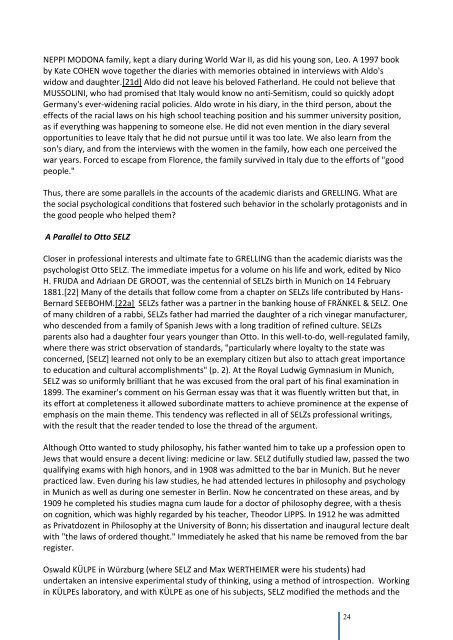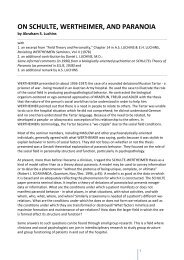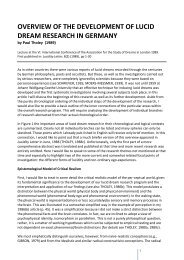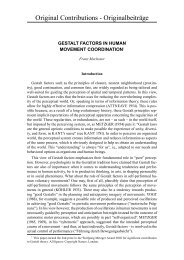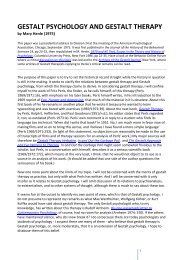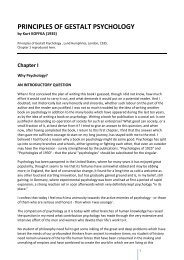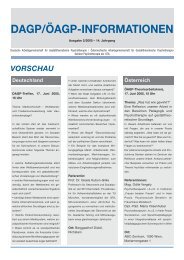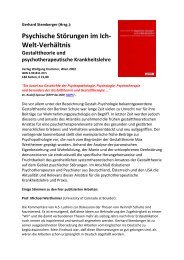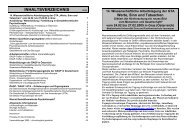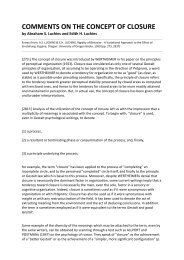pdf-Download - Society for Gestalt Theory and its Applications (GTA)
pdf-Download - Society for Gestalt Theory and its Applications (GTA)
pdf-Download - Society for Gestalt Theory and its Applications (GTA)
You also want an ePaper? Increase the reach of your titles
YUMPU automatically turns print PDFs into web optimized ePapers that Google loves.
NEPPI MODONA family, kept a diary during World War II, as did his young son, Leo. A 1997 book<br />
by Kate COHEN wove together the diaries with memories obtained in interviews with Aldo's<br />
widow <strong>and</strong> daughter.[21d] Aldo did not leave his beloved Fatherl<strong>and</strong>. He could not believe that<br />
MUSSOLINI, who had promised that Italy would know no anti-Semitism, could so quickly adopt<br />
Germany's ever-widening racial policies. Aldo wrote in his diary, in the third person, about the<br />
effects of the racial laws on his high school teaching position <strong>and</strong> his summer university position,<br />
as if everything was happening to someone else. He did not even mention in the diary several<br />
opportunities to leave Italy that he did not pursue until it was too late. We also learn from the<br />
son's diary, <strong>and</strong> from the interviews with the women in the family, how each one perceived the<br />
war years. Forced to escape from Florence, the family survived in Italy due to the ef<strong>for</strong>ts of "good<br />
people."<br />
Thus, there are some parallels in the accounts of the academic diarists <strong>and</strong> GRELLING. What are<br />
the social psychological conditions that fostered such behavior in the scholarly protagonists <strong>and</strong> in<br />
the good people who helped them<br />
A Parallel to Otto SELZ<br />
Closer in professional interests <strong>and</strong> ultimate fate to GRELLING than the academic diarists was the<br />
psychologist Otto SELZ. The immediate impetus <strong>for</strong> a volume on his life <strong>and</strong> work, edited by Nico<br />
H. FRIJDA <strong>and</strong> Adriaan DE GROOT, was the centennial of SELZs birth in Munich on 14 February<br />
1881.[22] Many of the details that follow come from a chapter on SELZs life contributed by Hans-<br />
Bernard SEEBOHM.[22a] SELZs father was a partner in the banking house of FRÄNKEL & SELZ. One<br />
of many children of a rabbi, SELZs father had married the daughter of a rich vinegar manufacturer,<br />
who descended from a family of Spanish Jews with a long tradition of refined culture. SELZs<br />
parents also had a daughter four years younger than Otto. In this well-to-do, well-regulated family,<br />
where there was strict observation of st<strong>and</strong>ards, "particularly where loyalty to the state was<br />
concerned, [SELZ] learned not only to be an exemplary citizen but also to attach great importance<br />
to education <strong>and</strong> cultural accomplishments" (p. 2). At the Royal Ludwig Gymnasium in Munich,<br />
SELZ was so uni<strong>for</strong>mly brilliant that he was excused from the oral part of his final examination in<br />
1899. The examiner's comment on his German essay was that it was fluently written but that, in<br />
<strong>its</strong> ef<strong>for</strong>t at completeness it allowed subordinate matters to achieve prominence at the expense of<br />
emphasis on the main theme. This tendency was reflected in all of SELZs professional writings,<br />
with the result that the reader tended to lose the thread of the argument.<br />
Although Otto wanted to study philosophy, his father wanted him to take up a profession open to<br />
Jews that would ensure a decent living: medicine or law. SELZ dutifully studied law, passed the two<br />
qualifying exams with high honors, <strong>and</strong> in 1908 was admitted to the bar in Munich. But he never<br />
practiced law. Even during his law studies, he had attended lectures in philosophy <strong>and</strong> psychology<br />
in Munich as well as during one semester in Berlin. Now he concentrated on these areas, <strong>and</strong> by<br />
1909 he completed his studies magna cum laude <strong>for</strong> a doctor of philosophy degree, with a thesis<br />
on cognition, which was highly regarded by his teacher, Theodor LIPPS. In 1912 he was admitted<br />
as Privatdozent in Philosophy at the University of Bonn; his dissertation <strong>and</strong> inaugural lecture dealt<br />
with "the laws of ordered thought." Immediately he asked that his name be removed from the bar<br />
register.<br />
Oswald KÜLPE in Würzburg (where SELZ <strong>and</strong> Max WERTHEIMER were his students) had<br />
undertaken an intensive experimental study of thinking, using a method of introspection. Working<br />
in KÜLPEs laboratory, <strong>and</strong> with KÜLPE as one of his subjects, SELZ modified the methods <strong>and</strong> the<br />
24


